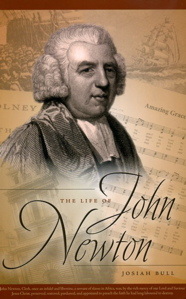Consider the Public This next section of John Newton's letter addresses the public nature of the proposed method the inquirer sought to address the pastor with whom he disagreed. I find within it much to consider when I post my thoughts on blogs or even on facebook. There are times when we engage in discussions of a spiritual nature on the various social networks and just as the pastor that Newton was writing to we need to bear in mind who the hearers might be. I recently commented on a friend's post about an issue related to how we as Christians ought to observe Christmas. I wished to support her in her desire to make Christ the heart of it and lay aside the focus of Santa, Elf on the Shelf, etc. I knew she was a believer and my response sought to encourage her and at the same time acknowledge that not all will share our convictions in this area-even other Christians will think we are foolishly depriving our children. The only one who will convict and convince of these things is God Himself and unless He does so then we will continue to look foolish to them. I made the mistake of saying in essence that they were the ones who were actually foolish and only God could straighten them out. While that is true, the problem with putting these things in writing is that people read their own tone and intent into it and if we are not careful with our word choice we can leave them with a very bad impression. That is what happened in the discussion that followed. Everyone reading my friend's post was not like-minded. Some were not even believers. That is the point that Newton is making here- while we may write with a particulal indiviual in mind, the public nature of our engagement means that we need to be aware of those who will also be reading it as well. Newton identifies three types of people who make up our audience. In the particular case he was addressing, the first person is the one with whom we disagree and those who share his opinions. He reminds his reader to keep in mind those ideas I shared in Part 1. Next are those "who pay too little regard to religion, to have any settled system of their own, and yet are preengaged in favor of those sentiments which are at least repugnant to the good opinion men naturally have of themselves. These are very incompetent judges of doctrine; but they can form a tolerable judgment of a writer’s spirit. " These are people who know what a Christian should look like and demonstrate as far as humilty, meekness, and love and will be quick to point out our lack of it if we are not careful. Newton says, "They are quick-sighted to discern when we deviate from such a spirit, and avail themselves of it to justify their contempt of our arguments." I can say with experience, yes they do! We need to be very careful in our discussions to maintain humilty throughout. If we engage in angry, embittered discussion Newton says we will discredit rather then further the "cause of truth." That is a point I really need to learn! I can become very self-righteous if I am not careful and be no better than the Pharisees of Jesus day. The third type of people who make up our audience are those who agree with us. Even with this audeince we have the oportunity to edify or bring harm. Newton makes this inportant observation, "There is a principle of self, which disposes us to despise those who differ from us; and we are often under its influence, when we think we are only showing a becoming zeal in the cause of God." In other words we often do not play nice with those who have differing opinions and the way we handle them can have an affect on even those with whom we agree on the issue at hand. He closes this portion of the letter with this point: "Yea, I would add, the best of men are not wholly free from this leaven; and therefore are too apt to be pleased with such representations as hold up our adversaries to ridicule, and by consequence flatter our own superior judgments. Controversies, for the most part, are so managed as to indulge rather than to repress his wrong disposition; and therefore, generally speaking, they are productive of little good. They provoke those whom they should convince, and puff up those whom they should edify. I hope your performance will savor of a spirit of true humility, and be a means of promoting it in others." Now if that is not a warning to reconsider jumping into the fray if I ever saw one. We really need to decide on these clearly controversial issues whether or not to even share our mind. And if we do it needs to be solely from a place that means to instruct for good and not because we feel the need to defend our viewpoint to feel superior. And above all it must be done in complete humility. Now if only I will take the time to consider all of these things before hitting "publish." Grace, peace, and mercy, Deb
0 Comments
|
AuthorI am a wife, a mother, a quilter, and most of all a follower of Jesus Christ. Join me on facebookFollow me on TwitterCategories
All
Archives
March 2016
|




 RSS Feed
RSS Feed